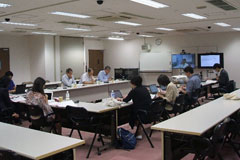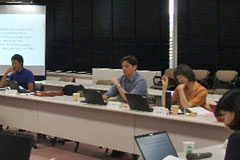Second Author Workshop of JICA-RI Project “Contextualizing International Cooperation for Sustaining Peace: Adaptive Peacebuilding Pathways”
2019.10.07
The second author workshop of the research project “Contextualizing International Cooperation for Sustaining Peace: Adaptive Peacebuilding Pathways” was convened at JICA Research Institute on Sept. 25, 2019. The purpose of the workshop was to introduce the background of the research, main drivers of conflict, and key peacebuilding actors as well as to identify the key challenges to sustaining peace in each case study of this project. The project advisors, Cedric de Coning, senior research fellow at the Norwegian Institute of International Affairs (NUPI); Akihisa Matsuno, professor at Osaka University; and Yasuhiro Takeda, professor at the National Defense Academy of Japan, shared their views and provided valuable feedback to the authors in context of preparation for their field researches.
Miyoko Taniguchi, JICA’s senior advisor on peacebuilding, introduced her case study related to peacebuilding in Mindanao, Philippines. Taniguchi’s research intends to analyze the role and contributions of national, local, and external actors in peacebuilding in the region. In particular, Taniguchi attempts to examine the interactions between external peacebuilding actors—including JICA, which has implemented development projects in the areas of infrastructure, socio-economic and community development, and governance—and multi-layered stakeholders, which include the Bangsamoro Development Agency (BDA) and civil society organizations. This case study intends to explore further alternative peacebuilding approaches in the Bangsamoro context.

The second author workshop explored case studies of peacebuilding approaches
Kohei Imai, research fellow at the Institute of Developing Economics - Japan External Trade Organization (IDE-JETRO), followed with a presentation focusing on the relationship between Turkey and the Syrian Turkmen, an ethnic minority in Syria, to facilitate further understanding of the Turkish responses to the Syrian civil war. Imai analyzed the quality of this relationship and examined how it contributes to achieving bottom-up and grassroots peacebuilding under a conflict-affected situation.
Lina Penagos, Ph.D. candidate at the University of Paris-Est, proposed a case study that underlined adaptive actions within the existing peacebuilding framework in Colombia. In this peacebuilding context, further research is necessary to understand the local dynamics between community leaders, government institutions, bilateral agencies, and the Catholic Church. Penagos intends to examine whether adaptive peacebuilding is being applied in the reconstruction of social linkages in scenarios of mistrust and institutional weaknesses associated with corruption and review the extent to which peacebuilders are able to assist stabilization under a “conflict order” created by non-conventional actors.
Ako Muto, senior research fellow at JICA-RI, presented an introduction to her case study on responses by the international community to the Syrian crisis. Muto examined cases of humanitarian assistance and international mediation in Syria and, in particular, the relationship between the activities of some of the OECD-DAC countries that have sought democratic state reconstruction through assisting opposition groups, and the UN that respected the sovereignty of Syria. Further, Muto emphasized that not all Syrian people are participating in the ongoing and complex pathway to sustaining peace in Syria and that her study will examine inclusive pathways for peace in Syria.
Masataka Nakauchi, associate professor at Osaka University, featured the issue of protracted “frozen conflicts” in his presentation. His present research attempts to clarify the background of the Transnistria issue and examine why it continued without escalating into a violent conflict. Nakauchi will also explore the impact of international interventions, especially by Russia and the European Union, and further explore the roles of various peacebuilding donors in the stabilization of Transnistria as well as other conflict-affected situations in that region.

JICA-RI Senior Research Fellow Ako Muto (right) and JICA-RI Research Fellow Rui Saraiva (center) gave presentations
Ryoji Tateyama, professor emeritus at the National Defense Academy of Japan, shed light on the contributions of international interventions under structural asymmetric circumstances in Palestine. He particularly focused on the case of Temporary International Presence in Hebron (TIPH) in the West Bank and the Gaza Reconstruction Mechanism (GRM) in the Gaza Strip. He emphasized that both interventions had been conducted while taking into account the respective local contexts and that they could be useful in understanding the pathway to peace in the region.
Rui Saraiva, research fellow at JICA-RI, presented his case study on evolving peacebuilding approaches in Mozambique. His focus was on the 2013 resurgent armed conflict between the Mozambican Government and the Mozambican National Resistance (RENAMO), which was followed by the emergence of an Islamic insurgency in Cabo Delgado province in 2017. Both events revealed that sustaining peace had not been realized in Mozambique and that further measures were required to address the remaining grievances and achieve national stability in the country. Saraiva will focus his research on new Disarmament, Demobilization and Reintegration (DDR) programs, the current changes in the decentralization process, and the impact and effectiveness of recent peacebuilding initiatives in Mozambique.
Cedric de Coning concluded the workshop with a presentation on “Adaptive peacebuilding in practice.” De Coning highlighted examples from Christian Aid Ireland, the Systemic Action Research at the University of Sussex, and the Comprehensive Performance Assessment System in the context of UN Peacekeeping Operations. Topics such as adaptive mind-set, adaptive processes and tools, performance evaluation, and outcome assessment were some of the elements highlighted in De Coning’s presentation.

事業事前評価表(地球規模課題対応国際科学技術協力(SATREPS)).国際協力機構 地球環境部 . 防災第一チーム. 1.案件名.国 名: フィリピン共和国.

事業事前評価表(地球規模課題対応国際科学技術協力(SATREPS)).国際協力機構 地球環境部 . 防災第一チーム. 1.案件名.国 名: フィリピン共和国.

事業事前評価表(地球規模課題対応国際科学技術協力(SATREPS)).国際協力機構 地球環境部 . 防災第一チーム. 1.案件名.国 名: フィリピン共和国.

事業事前評価表(地球規模課題対応国際科学技術協力(SATREPS)).国際協力機構 地球環境部 . 防災第一チーム. 1.案件名.国 名: フィリピン共和国.

事業事前評価表(地球規模課題対応国際科学技術協力(SATREPS)).国際協力機構 地球環境部 . 防災第一チーム. 1.案件名.国 名: フィリピン共和国.
scroll